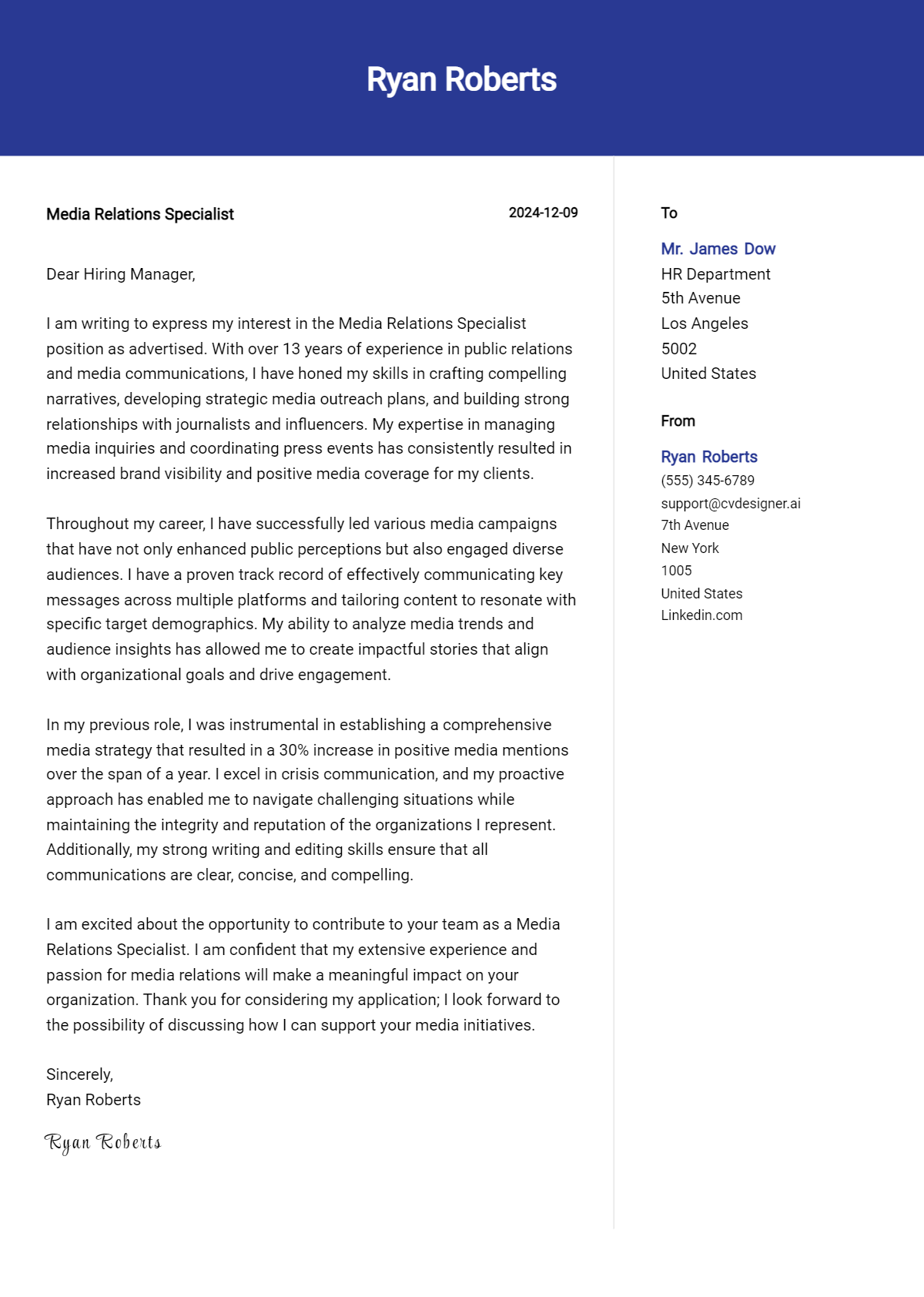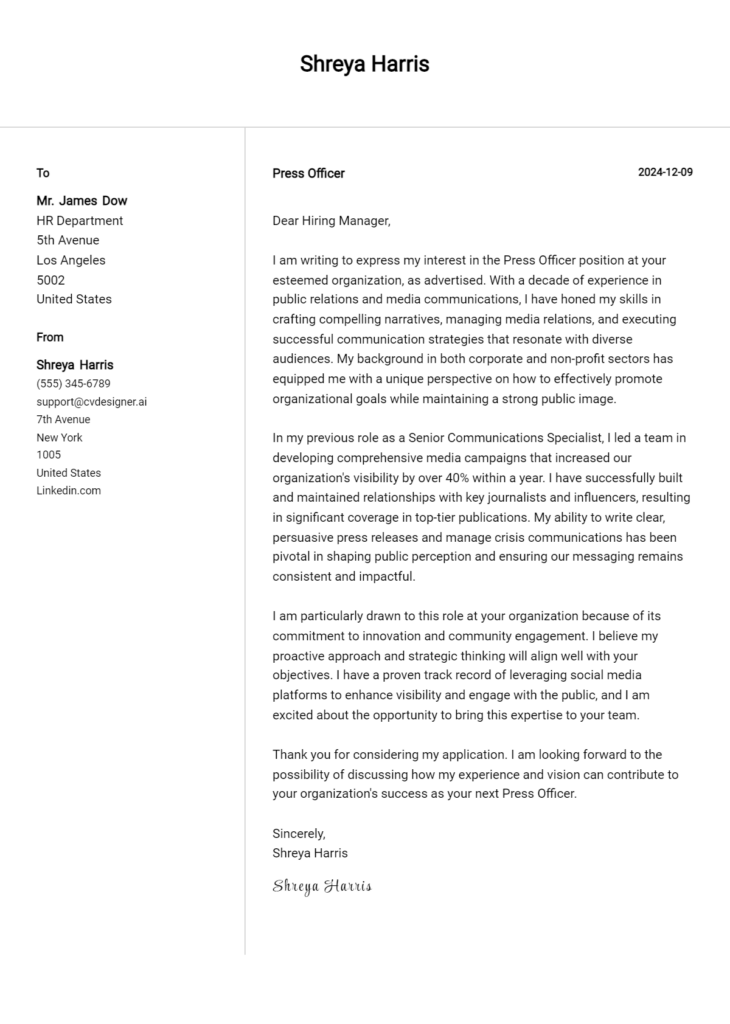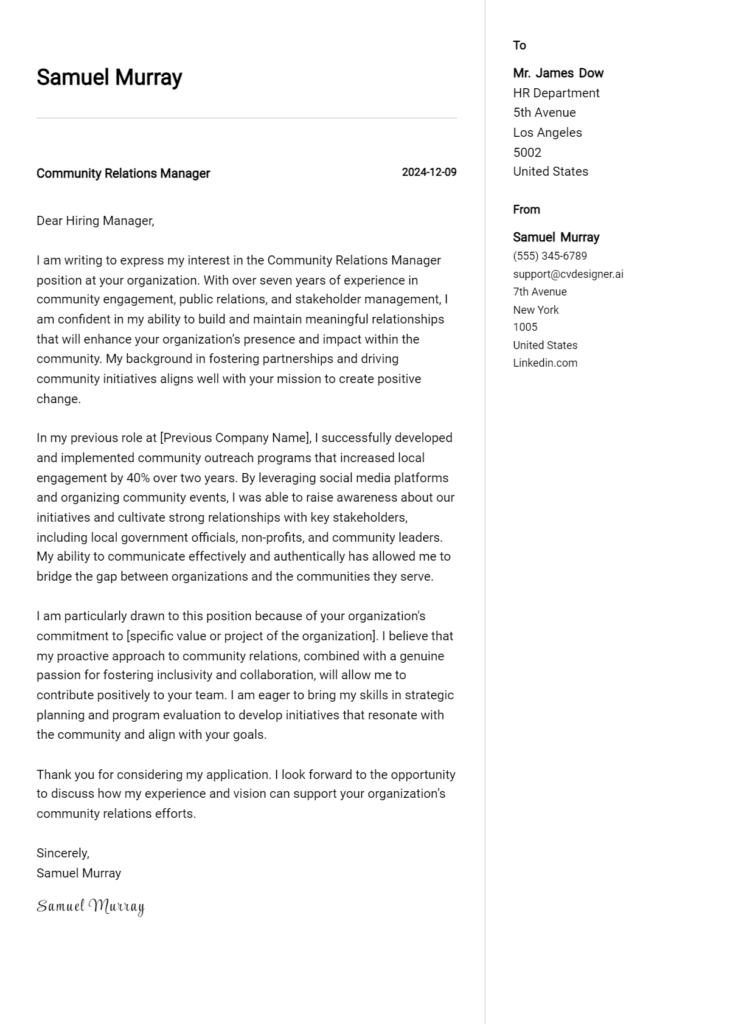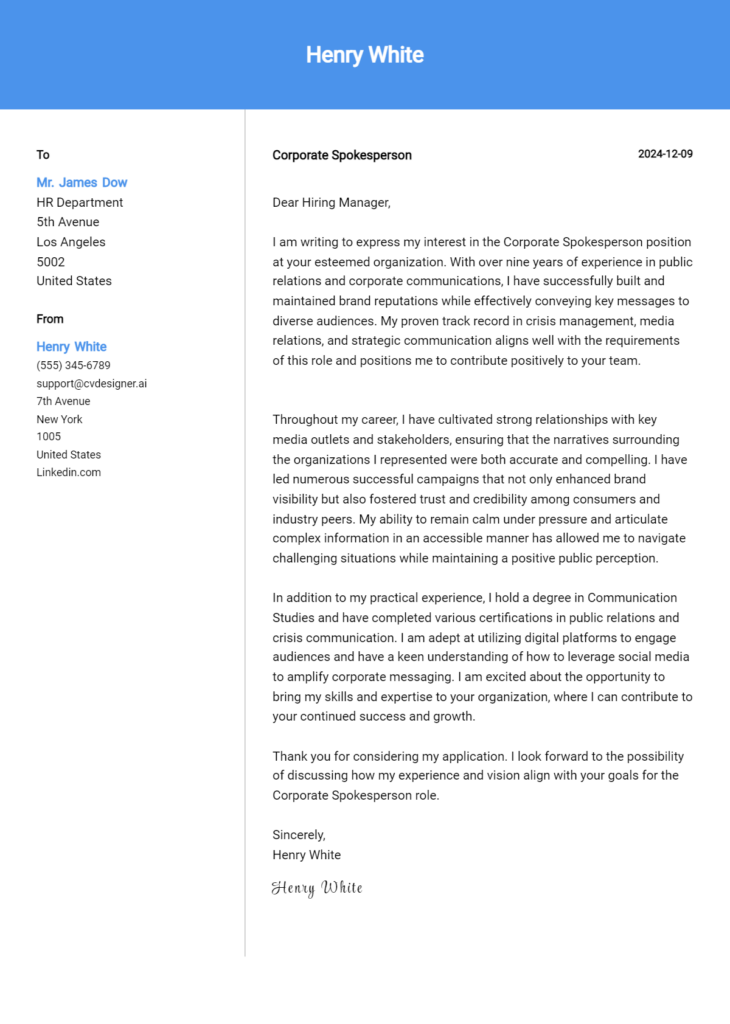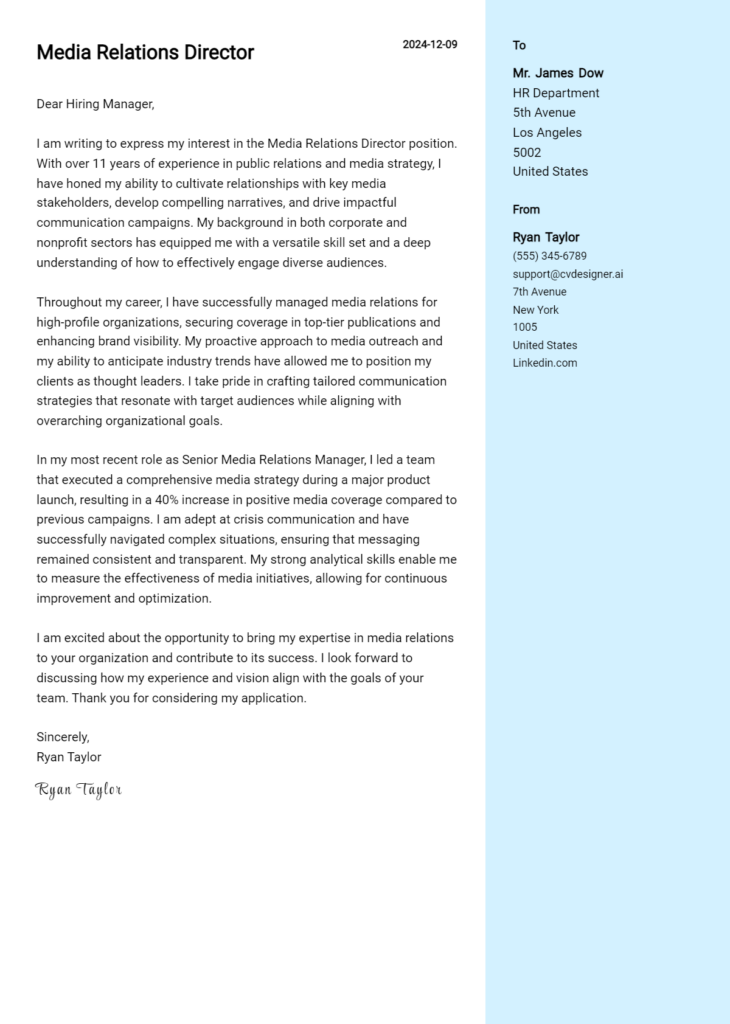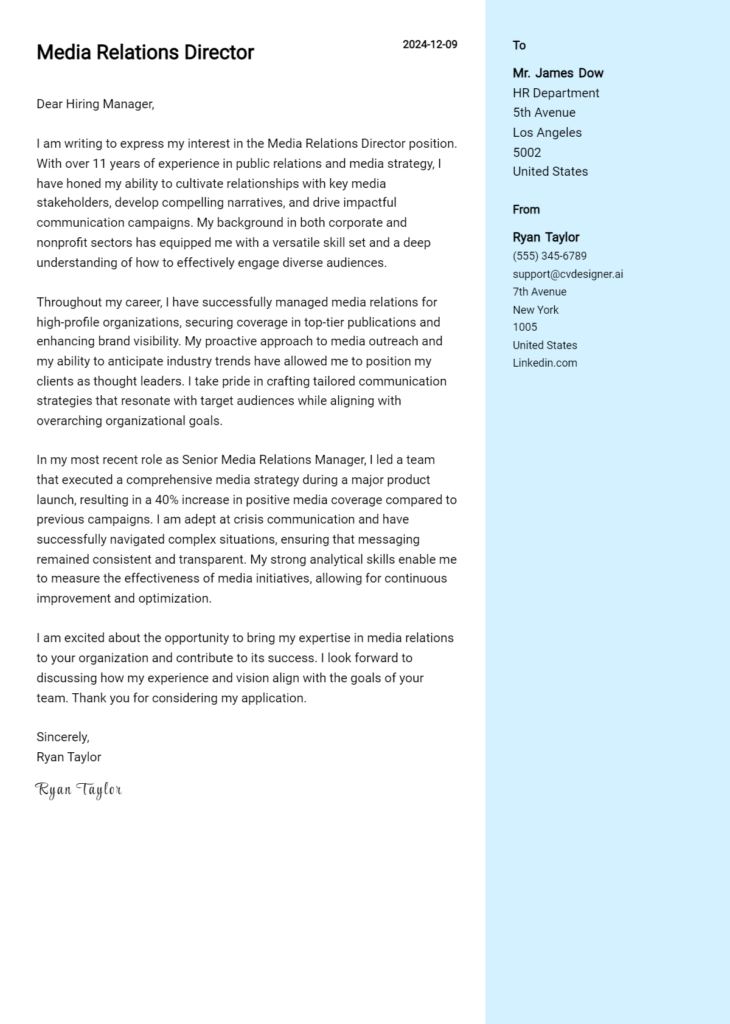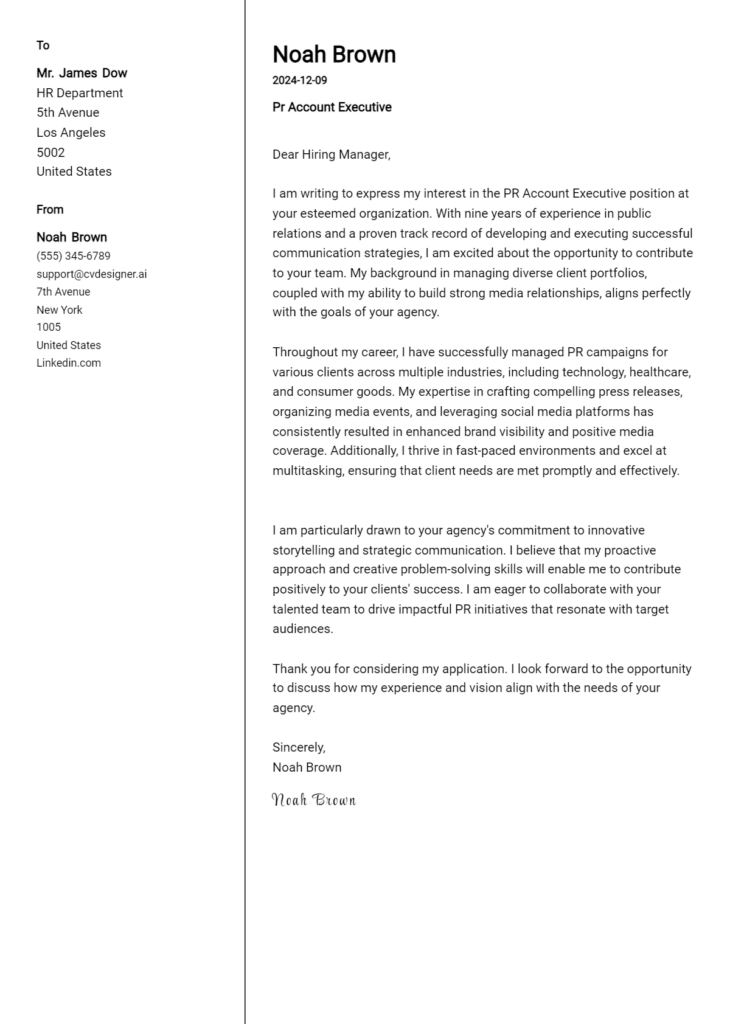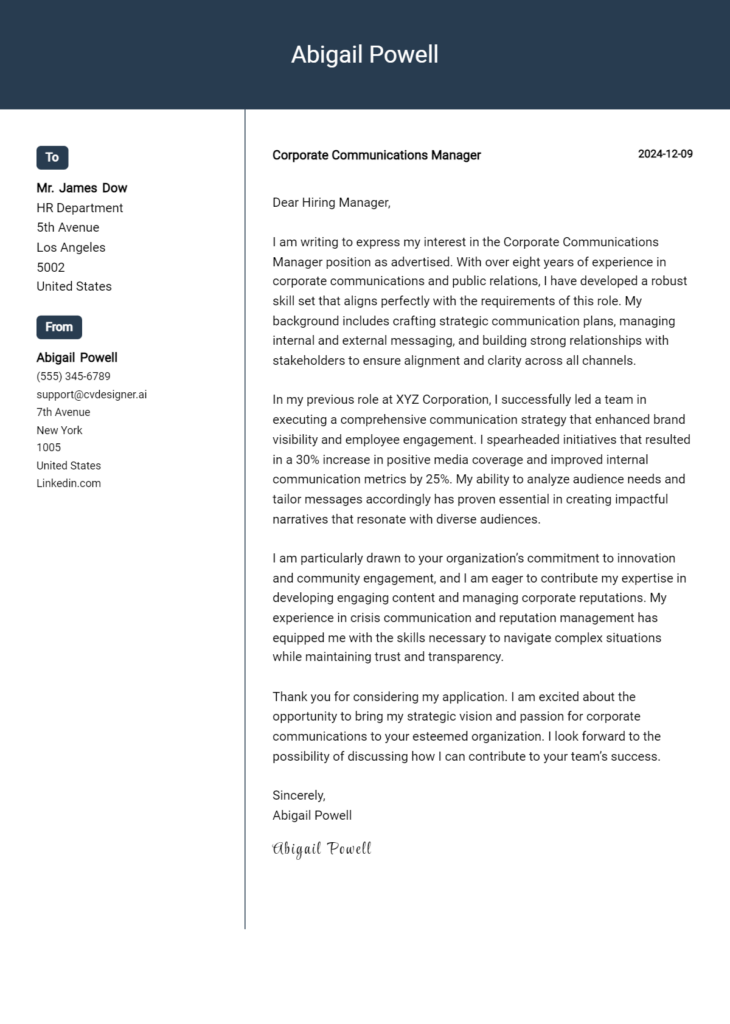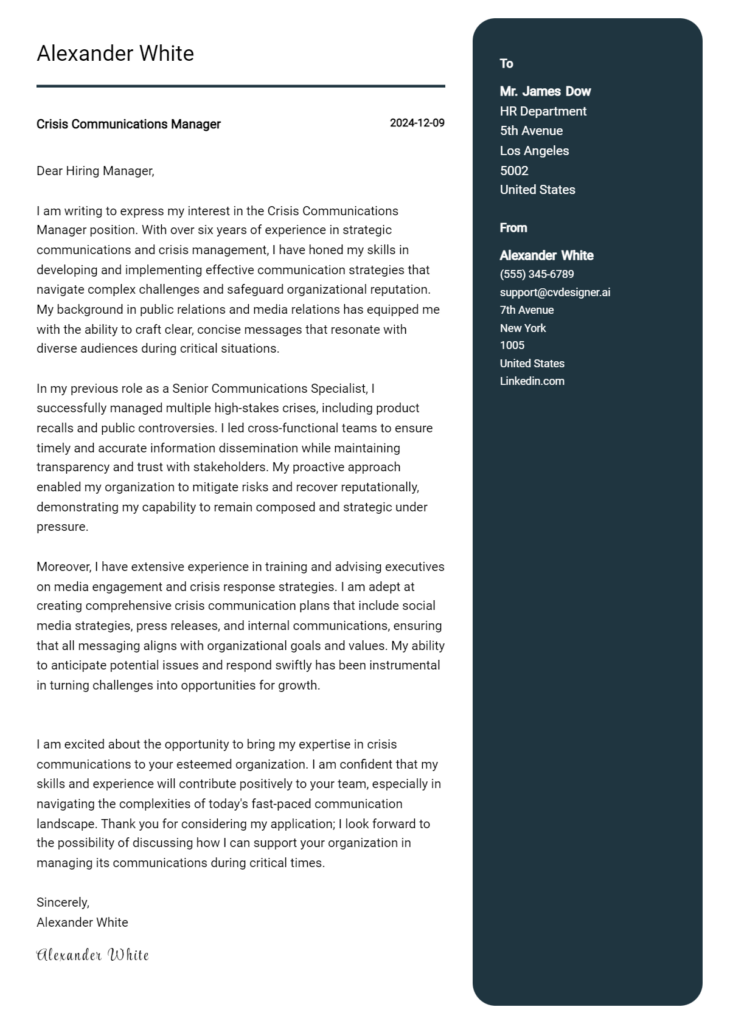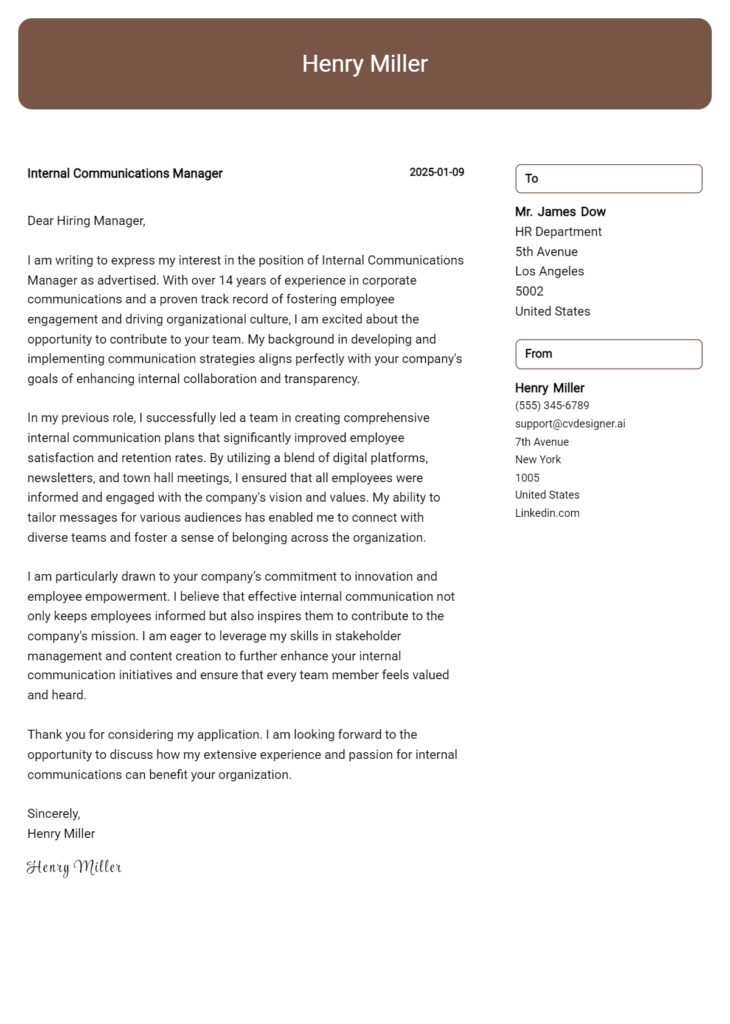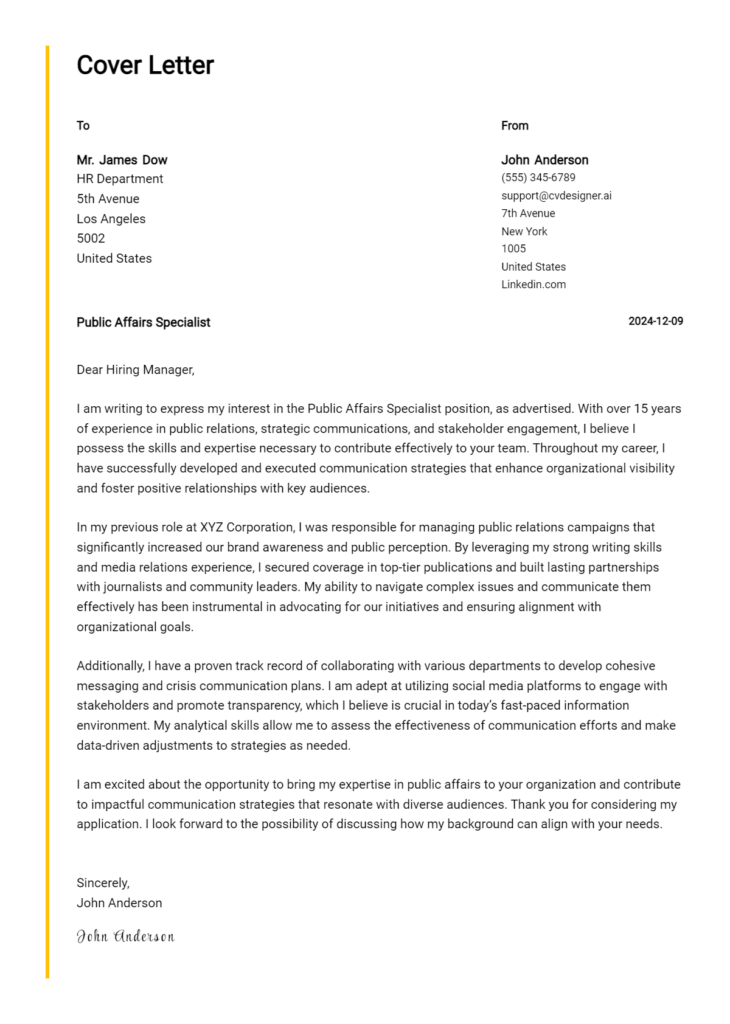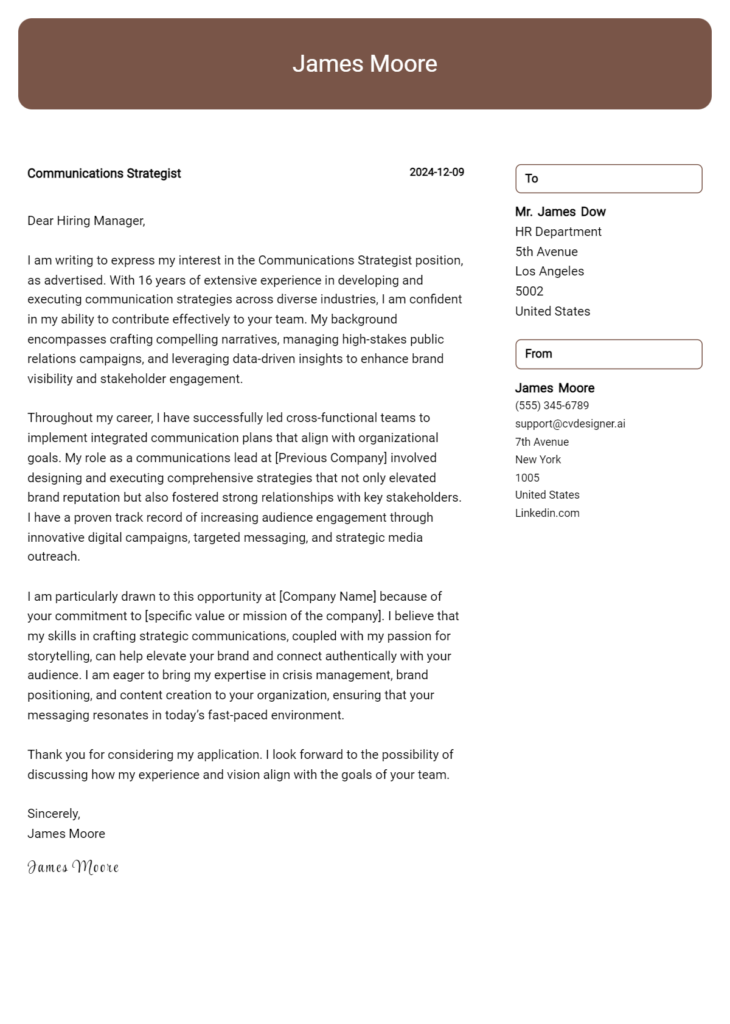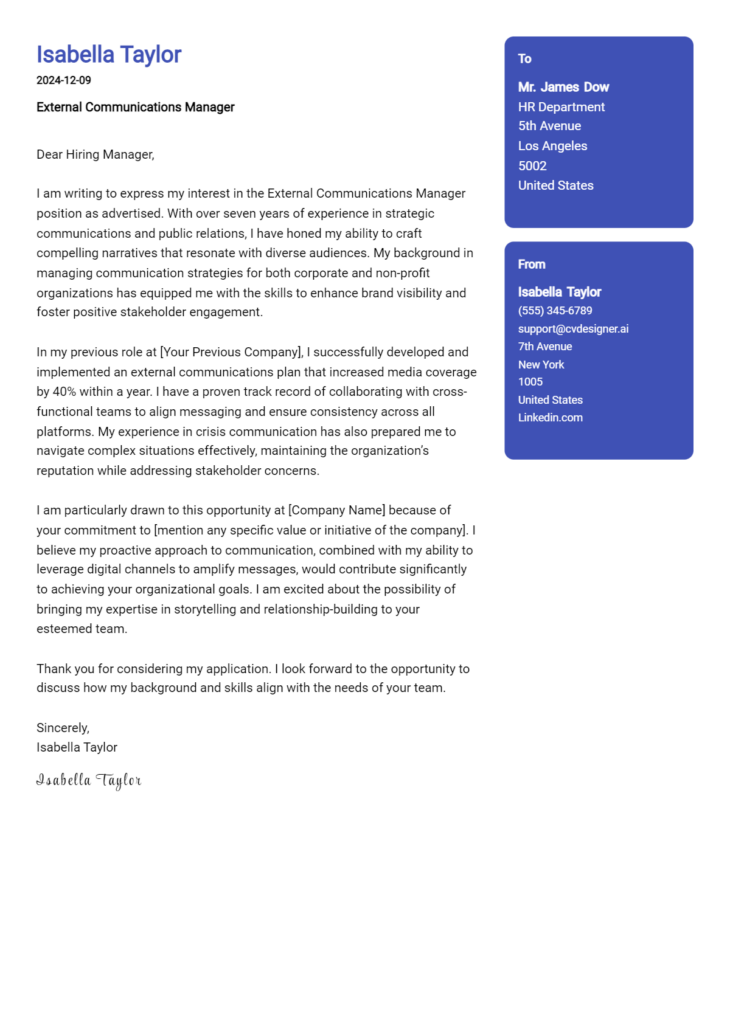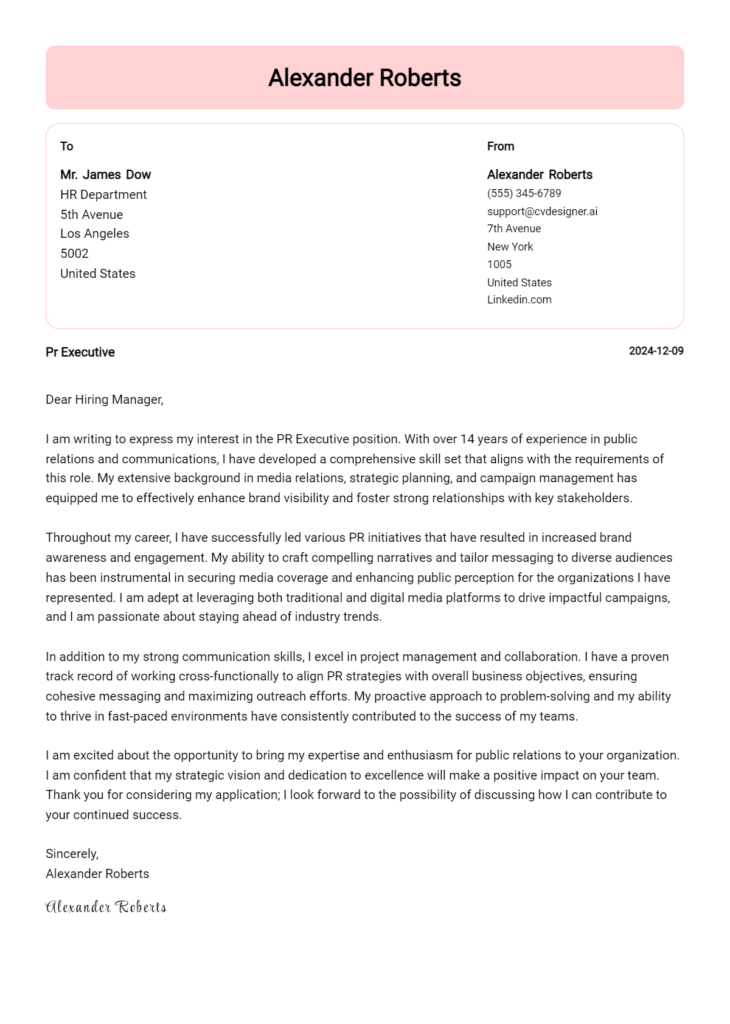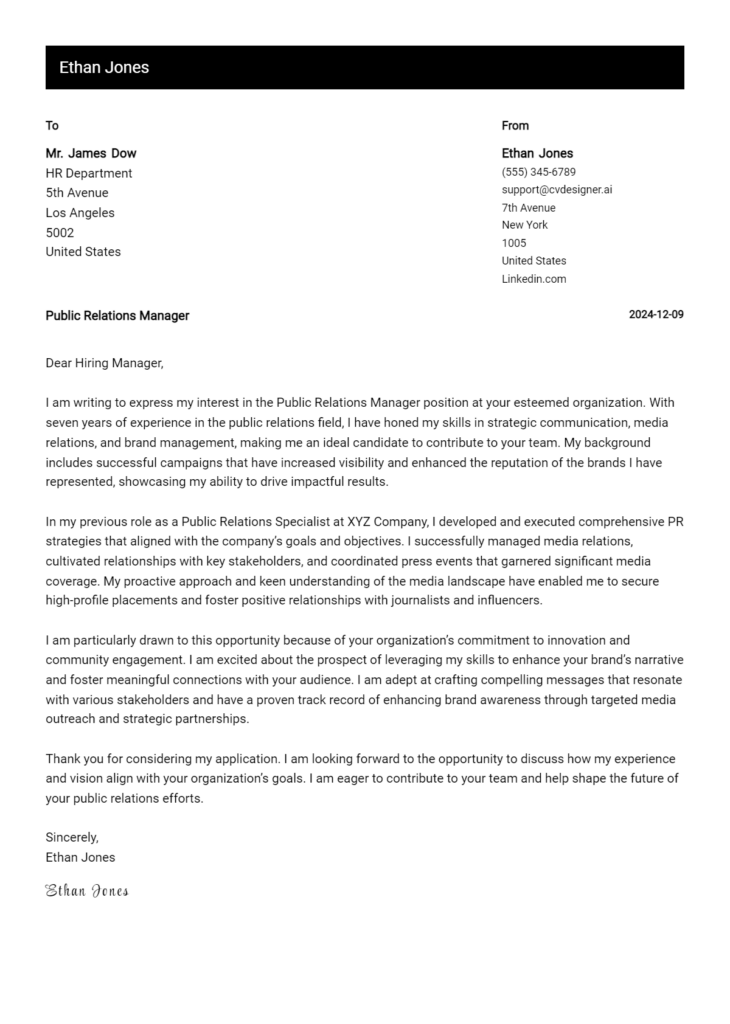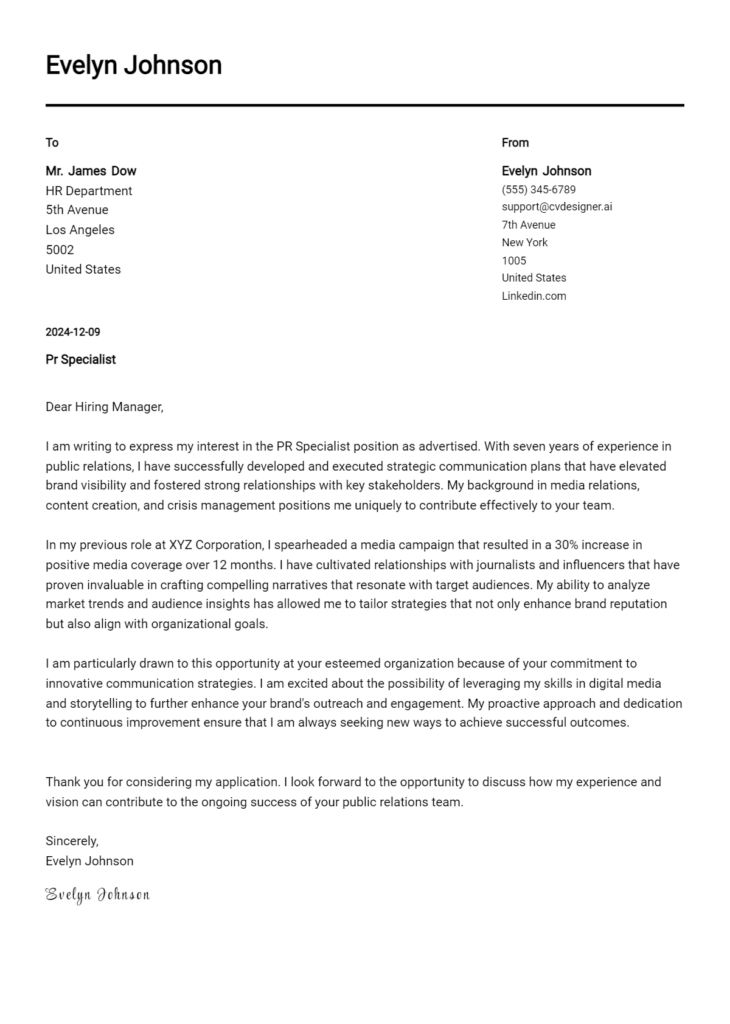Media Relations Specialist Cover Letter Examples
Explore additional Media Relations Specialist cover letter samples and guides and see what works for your level of experience or role.
How to Format a Media Relations Specialist Cover Letter?
Crafting an effective cover letter is essential for a Media Relations Specialist, as it serves as your first introduction to potential employers. The way you format your cover letter not only showcases your communication skills but also demonstrates your understanding of media dynamics and relationship-building—critical components of the role. A well-structured cover letter can capture the attention of hiring managers, reflecting your professionalism and ability to convey messages clearly and persuasively.
In this guide, we'll discuss how to format your cover letter, providing insights and examples tailored specifically for the media relations field.
We'll focus on the essential components of a professional cover letter, including:
- Cover Letter Header
- Cover Letter Greeting
- Cover Letter Introduction
- Cover Letter Body
- Cover Letter Closing
Each section is crucial in highlighting your qualifications and expertise. Let’s break down each part and explore how to make your Media Relations Specialist cover letter truly stand out.
Importance of the Cover Letter Header for a Media Relations Specialist
A well-structured cover letter header is essential for a Media Relations Specialist, as it sets the tone for professionalism and attention to detail. The header should include your contact information, the date, and the recipient's details. Clarity is crucial; a neatly organized header not only makes a strong first impression but also ensures that your application can be easily identified and retrieved by the hiring manager. A clear and professional header reflects your understanding of effective communication, which is vital in media relations.
Strong Example
Jane Doe 123 Main Street Cityville, State, 12345 jane.doe@email.com (123) 456-7890 October 1, 2023 Mr. John Smith Hiring Manager XYZ Media Group 456 Elm Street Townsville, State, 67890
Weak Example
jane doe email: jane.doe@email.com 10/1/2023 to whom it may concern,
The Importance of a Cover Letter Greeting for a Media Relations Specialist
The greeting of a cover letter is crucial as it sets the tone for the rest of the letter and establishes a connection with the hiring manager. A well-crafted greeting demonstrates professionalism and shows that you have taken the time to personalize your application. By addressing the hiring manager directly, you convey respect and a genuine interest in the position. To avoid generic greetings like "To Whom It May Concern," it’s important to conduct research to find the recipient's name, which can often be found on the company's website or LinkedIn profile. A personalized greeting not only makes a strong first impression but also reflects your attention to detail, a vital skill for a Media Relations Specialist.
Strong Greeting Example
Dear Ms. Johnson,
Weak Greeting Example
To Whom It May Concern,
Crafting an Engaging Cover Letter Introduction for a Media Relations Specialist
A well-crafted cover letter introduction is crucial for a Media Relations Specialist as it serves as the first impression to the hiring manager. In this fast-paced industry, it is essential to capture attention immediately, demonstrating both enthusiasm for the role and an understanding of its significance. A compelling introduction should succinctly express the candidate’s interest while highlighting key skills or achievements that align with the job requirements. The right introduction can set the tone for the entire cover letter, making it memorable and impactful.
Strong Example
Dear [Hiring Manager's Name], As a passionate Media Relations Specialist with over five years of experience in crafting compelling narratives and building strategic media partnerships, I was thrilled to discover the opening at [Company Name]. My proven track record of increasing media coverage by 40% for previous clients, combined with my proactive approach to crisis communication, positions me as an ideal candidate to elevate your brand's visibility and reputation in today's competitive landscape.
Weak Example
Dear [Hiring Manager's Name], I am writing to apply for the Media Relations Specialist position at [Company Name]. I have some experience in media relations and think it would be a good job for me. I hope you will consider my application.
Purpose of the Cover Letter Body for a Media Relations Specialist
The cover letter body for a Media Relations Specialist serves as a critical platform for candidates to articulate their relevant skills, experiences, and the unique value they bring to the organization. This section should effectively highlight specific projects or accomplishments that demonstrate the candidate's ability to manage media relations, craft compelling narratives, and foster positive relationships with journalists and stakeholders. By showcasing quantifiable successes, such as increasing media coverage for a campaign or successfully navigating a crisis through strategic communication, candidates can illustrate their potential impact on the company's public image and media presence.
Strong Example
I successfully led a media campaign for XYZ Company that resulted in a 40% increase in positive media coverage over six months. By developing targeted press releases and leveraging social media platforms, I secured features in top-tier publications, including The New York Times and Forbes. Additionally, I organized a press event that attracted over 100 journalists, enhancing our brand visibility and fostering valuable relationships with key media contacts. My proactive approach to media outreach and crisis management during challenging times has consistently supported organizational goals and enhanced our reputation.
Weak Example
I have done some media work in the past. I think I can help your company with media relations. I once wrote a press release, and it got sent out. I am good at talking to people and think I could do well in this role.
Importance of the Cover Letter Closing for a Media Relations Specialist
The closing paragraph of a cover letter serves as a final opportunity to reinforce your qualifications and express your enthusiasm for the Media Relations Specialist position. This section should succinctly summarize your key strengths, reiterate your interest in the role, and encourage the hiring manager to take the next steps, such as reviewing your resume or arranging an interview. A strong closing can leave a lasting impression, while a weak one may diminish the overall impact of your application.
Strong Example
Thank you for considering my application for the Media Relations Specialist position. With my proven track record in managing successful media campaigns and my passion for storytelling, I am excited about the opportunity to contribute to your team. I invite you to review my resume for further details on my experience. I look forward to the possibility of discussing how I can help elevate your media presence in an interview.
Weak Example
I think I would be good for this job, and I hope you like my resume. Please get back to me if you want to talk. Thanks.
These tips will help candidates craft an effective cover letter for a Media Relations Specialist position. A well-written cover letter is crucial for making a strong first impression and should highlight your technical skills, problem-solving abilities, understanding of the Software Development Life Cycle (SDLC), teamwork experience, and passion for continuous learning. Here are five detailed tips to enhance your cover letter:
Tips for Crafting Your Cover Letter
Showcase Your Technical Skills:
Media Relations Specialists often utilize various tools and platforms for effective communication and analysis. Be sure to mention specific technologies or software you are proficient in, such as media monitoring tools, social media platforms, or content management systems. This demonstrates your readiness to handle the technical aspects of the role.Demonstrate Problem-Solving Abilities:
In the fast-paced world of media relations, challenges arise frequently. Highlight instances where you've successfully navigated crises or resolved conflicts through strategic communication. Use specific examples to illustrate your ability to think critically and act decisively under pressure.Highlight Your SDLC Knowledge:
Understanding the Software Development Life Cycle is crucial, especially if your role involves collaborating with technical teams. Mention any experience you have working within this framework, emphasizing how it has enhanced your communication strategies and project outcomes.Emphasize Teamwork Experience:
Media relations often involves collaboration with various departments, including marketing, PR, and product development. Share examples of successful projects where teamwork was essential. This will show employers that you can effectively work with diverse groups to achieve common goals.Express Your Passion for Continuous Learning:
The media landscape is constantly evolving, and a successful Media Relations Specialist must stay current with trends and technologies. Convey your commitment to ongoing professional development by mentioning any relevant courses, certifications, or workshops you've participated in. This dedication to learning can set you apart from other candidates.
For additional guidance, check out our cover letter templates and utilize the cover letter builder to streamline your writing process.
Common Mistakes to Avoid in a Media Relations Specialist Cover Letter
Crafting a compelling cover letter is essential for standing out as a Media Relations Specialist, as it can be your first impression with potential employers. Avoiding common mistakes can greatly enhance your chances of success. Here are some pitfalls to watch out for:
Generic Greetings: Using a generic salutation like "To Whom It May Concern" can make your letter feel impersonal. Instead, research the hiring manager's name and address them directly.
Lack of Specificity: Failing to tailor your cover letter to the specific job description can make you seem unqualified. Reference specific skills and experiences that align with the role, such as your knowledge of media channels or experience with press releases.
Overly Lengthy Content: A cover letter should be concise and focused. Aim for one page and make every sentence count to maintain the reader's attention. Check out this cover letter format for guidance on structuring your content effectively.
Ignoring the Company Culture: Not aligning your tone and language with the company’s culture can create a disconnect. Research the organization and reflect their voice in your writing.
Neglecting Proofreading: Spelling and grammatical errors can undermine your professionalism. Always proofread your letter multiple times or ask a friend to review it before submission.
Focusing Solely on Qualifications: While qualifications are important, also convey your passion for media relations and how you can contribute to the company's goals.
Not Including a Call to Action: Failing to express your desire for an interview can leave your letter feeling incomplete. End with a proactive statement inviting further conversation.
By avoiding these common mistakes and crafting a thoughtful letter, you can present yourself as a strong candidate for the Media Relations Specialist role. For additional insights, consider reviewing cover letter examples that can inspire your writing.
Cover Letter FAQs for Media Relations Specialist
What should I include in my cover letter for a Media Relations Specialist position?
In your cover letter, you should highlight your relevant experience in media relations, public relations, or communications. Mention specific skills such as writing press releases, managing media inquiries, and building relationships with journalists. Include examples of successful campaigns or projects you have led, emphasizing your ability to secure media coverage and navigate crisis situations. Tailor your cover letter to the specific job description by addressing the key responsibilities and qualifications mentioned. Don't forget to convey your passion for storytelling and your understanding of the media landscape, as these are crucial in this role.
How can I demonstrate my writing skills in my cover letter?
To showcase your writing skills in your cover letter, focus on clarity, conciseness, and engagement. Start with a strong opening that grabs attention, and maintain a professional tone throughout. Use active voice and avoid jargon to ensure readability. You can also mention specific writing projects you've completed, such as press releases or articles, and provide brief outcomes, like increased media coverage or audience engagement. Including a link to your portfolio or samples of published work can further illustrate your capabilities. Remember, your cover letter itself serves as a writing sample, so it should reflect your proficiency.
Should I include metrics or achievements in my cover letter?
Absolutely! Including metrics and specific achievements in your cover letter can significantly strengthen your application. For example, if you secured a certain percentage increase in media mentions or successfully organized an event that attracted significant press coverage, be sure to include those figures. Quantifying your accomplishments provides tangible evidence of your effectiveness in the media relations field. This not only demonstrates your capability but also shows potential employers the value you can bring to their organization. Just ensure that the metrics are relevant to the position you are applying for.
How do I address a lack of experience in media relations in my cover letter?
If you lack direct experience in media relations, focus on transferable skills and related experiences. Highlight any communications, marketing, or public relations roles you've held that involved writing, content creation, or audience engagement. Emphasize your ability to learn quickly and adapt in fast-paced environments. You can also mention relevant coursework, internships, or volunteer work that showcases your knowledge of media practices. Additionally, express your enthusiasm for the field and your commitment to developing your skills further. Employers often value potential and a proactive attitude, so convey your eagerness to grow in the role.
Build your Cover Letter in minutes
Use an AI-powered cover letter builder and have your letter done in 5 minutes. Just select your template and our software will guide you through the process.

